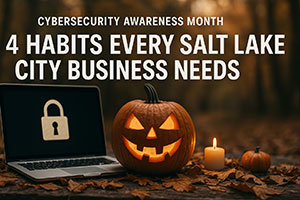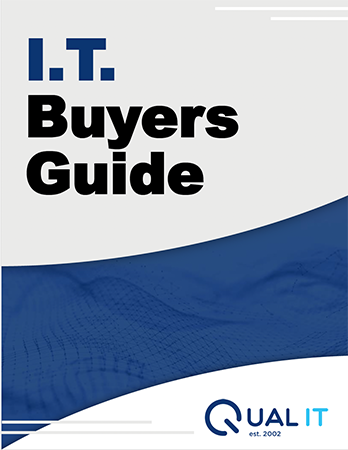 October is Cybersecurity Awareness Month—and for Salt Lake City CPA firms, it's more than just a calendar event. It's a critical reminder to take stock of the systems, safeguards, and habits that keep your client data secure, your compliance intact, and your firm running without disruption during peak season.
October is Cybersecurity Awareness Month—and for Salt Lake City CPA firms, it's more than just a calendar event. It's a critical reminder to take stock of the systems, safeguards, and habits that keep your client data secure, your compliance intact, and your firm running without disruption during peak season.
Here’s the hard truth: Most cyber incidents in CPA firms don’t come from sophisticated attacks. They stem from simple oversights—a staff accountant clicking a phishing link, a missed software update, or reusing a password already compromised in a prior breach.
The good news? Small, smart changes in your IT support strategy can create major leaps in security and peace of mind.
Here are the four cybersecurity habits every Salt Lake City CPA firm needs to hardwire into its workflow:
- Communication
Cybersecurity isn’t just an IT department problem—it’s a firm-wide responsibility. But let’s face it, most CPAs aren’t thinking about security protocols when they’re racing against a filing deadline. That’s why frequent, simple communication is essential.
Here’s how to start:
- Add a 60-second cybersecurity tip to your weekly firm meeting.
- Share real examples of scams targeting Salt Lake City firms (yes, they’re getting smarter).
- Make it easy for team members to report suspicious activity—and reward them for it.
When your IT provider isn’t just fixing problems but educating your staff on threats before they become disasters, you build a culture where security is second nature.
- Compliance
If you process returns, manage payroll, or handle audits, then compliance isn’t optional. Whether it’s GLBA, AICPA, FTC Safeguards, or IRS Pub 4557, regulatory requirements are tightening—and penalties for missteps are steep.
But here’s the thing: compliance isn’t just a checklist. It’s a daily discipline.
Make sure your Salt Lake City IT provider:
- Conducts regular compliance reviews (at least quarterly).
- Documents every employee training and policy update.
- Helps you stay audit-ready—without pulling you away from client work.
CPA clients don’t just want their taxes filed; they want to know their financial data is handled with airtight integrity. Don’t leave that trust to chance.
- Continuity
Picture this: it’s the middle of tax season and your cloud-based file system goes down. Even for an hour. What’s your plan?
Business continuity is one of the most overlooked (and under-tested) areas of IT support in accounting firms. Here’s what you should expect:
- Automatic daily backups with real-time alerts.
- Ransomware playbooks that are actually tested, not just theoretical.
- Periodic disaster recovery drills, even if it’s just restoring a single file.
Strong IT services for CPA firms aren’t just about preventing problems. They’re about having a bulletproof plan when (not if) something goes wrong.
- Culture
Your IT setup might be top-tier, but it only takes one careless login to bring it all down. That’s why your team’s habits are your first (and strongest) line of defense.
Want to build a security-first culture?
- Require password managers firmwide—no exceptions.
- Enable MFA across every app, portal, and device.
- Publicly recognize employees who flag suspicious emails or activity.
This isn’t about fear-mongering. It’s about building pride around protection. When your staff owns cybersecurity, everyone wins.
Security Is a CPA Firm's Responsibility—Not Just IT's
Cybersecurity Awareness Month isn’t about checking boxes. It’s about rethinking how your firm operates day-to-day. Because the next data breach won’t wait for a quiet moment—it’ll hit during your busiest week, when your team is maxed out and focused on deliverables.
You don’t have to be a cybersecurity expert. You just need to work with IT professionals who understand the high-stakes world you operate in.
Ready to Get Serious About Cybersecurity?
If you’re a CPA firm in Salt Lake City and you're still relying on generic IT support, it’s time to level up. The risks are real. So are the solutions.
Click here to book your free network assessment with Qual IT.
Let’s build a proactive IT strategy that protects your reputation, your data, and your clients—so you can focus on running your firm, not firefighting tech issues.



